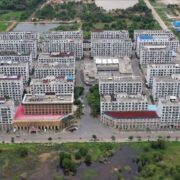Why Filipinos feel that ‘no one can get a job anymore’

“Apply lang nang apply.” It’s the phrase echoing across job boards, group chats, and TikTok videos—a rallying cry turned inside joke for today’s job seekers. Behind every “We regret to inform you” email is a generation caught between qualifications and disillusionment, wondering how finding work became a full-time job in itself.
Even qualified, fresh graduates and most dedicated workers struggle to break through. And it begs the question: Why does landing a job feel impossible for so many Filipinos today?
A dystopian market
The aftermath of the flood control corruption scandal has left economic scars. What began as an exposé of misuse of public funds quickly cascaded into a crisis of confidence among investors, businesses, and consumers.
During the week of Aug. 25 to 29, the Philippine Stock Exchange saw a drop in capitalization by 1.71 percent—roughly P330 billion—reflecting investor unease as revelations of public fund mismanagement continued to surface.
When investors lose confidence in a country’s economy, they are less likely to put money into businesses or new projects. Without investment, companies may postpone expansion, reduce hiring, or even lay off workers. This directly affects employment, as fewer jobs are created and existing positions may be at risk.
Funds that could have supported and stabilized micro, small, and medium enterprises (MSMEs) were instead lost to corruption. MSMEs, regarded as the backbone of the Philippine economy, employ the majority of the country’s workforce and drive much of its domestic commerce. Already struggling with high operating costs and a weak post-pandemic recovery, these businesses now face even greater barriers to survival and growth.
Government-backed financing, such as loans from the Department of Trade and Industry’s Small Business Corporation (SB Corp.), provides some relief but remains insufficient to meet demand. As a result, MSMEs struggle to expand, hire, or even sustain operations, leaving fewer job opportunities for Filipino workers.
The combination of corruption, diverted public funds, and limited government support has created a dystopian market—one in which economic stagnation constrains both business growth and employment prospects.
The (dystopian) beauty pageant of hiring
As employment opportunities shrink, job hunting in the Philippines has transformed into a high-stakes contest for visibility.
Graduates and entry-level workers searching for stable employment must now compete not just on skills and education but on their ability to market themselves online. Even on LinkedIn, the process can give the illusion of an easy opportunity. A few clicks on the “Easy Apply” button seem to open doors—but in reality, many job postings demand years of experience or over-the-top qualifications for entry-level roles, often with salaries that do not match the qualifications required. For fresh graduates and younger applicants, simply meeting the listed requirements can feel impossible.
The June 2025 Labor Force Survey by the Department of Labor and Employment revealed a 2.6-percentage-point increase in unemployed college graduates, rising from 35.6 percent in December 2024. These numbers reflect the growing frustration among young Filipinos navigating a hiring system that often favors connections and self-promotion over skills alone.
Online guides often suggest rewriting a résumé for every single application. Considering it can take roughly 100 applications to land one offer, this means hundreds of tailored résumés just to secure a chance at an interview. The later stages of hiring can demand even more unpaid labor: Multi-round interviews, skill assessments, and assignments—all before a single job offer is extended—if you are lucky.
Long-term employment versus freelancing
At this point, the process can feel like a full-time job in itself.
This grueling process has contributed to a widening mismatch in the job market. Many graduates no longer pursue positions aligned with their education or expertise, instead settling for roles that are more accessible, even if unrelated. At the same time, the booming freelance and gig economy has created alternative pathways for income.
Instead of traditional, long-term employment, many workers now take on temporary, contract, or freelance jobs arranged through digital platforms connecting them with clients. These jobs are often unstable, underpaid, and come with little to no benefits or insurance.
Yet for countless Filipinos, freelancing has become a necessary lifeline, patching the gaps left by a labor market in crisis and a state unable to provide decent, stable employment.
So remember: If you’re still looking for a job, it’s not automatically a “you” problem. Graduates and workers are navigating a labor market defined by systemic challenges—shrinking opportunities, fierce competition, and structural barriers. Struggling to find work is not automatically a reflection of effort or skill; these obstacles are built into the system, not the individual.

















